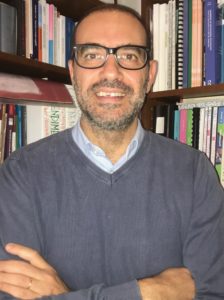Keynote speakers 2010-19
Marco Spruit, Ph.D., University Utrecht, Netherlands
He is an associate professor in the Information and Computing Sciences (ICS) department at the Faculty of Science of Utrecht University (UU) in The Netherlands. As principle investigator in the department’s Applied Data Science Lab, his research centres around Model-Driven Analytic Systems for Self-Service Data Science. He prominently participated in defining the new UU research focus area on Applied Data Science (ADS) and he is a member of UU’s Applied Data Science Education Committee as well as co-organiser of the ADS Special Interest Group on Text Mining. Research highlights include his team’s contributions to three Horizon2020 projects and two nationally funded projects on Analytic Systems. He has authored 150+ publications including 55+ journal papers. HIs ADS research team currently consists of 11 Ph.D students and 1 scientific programmer.
He acts as the programme coordinator for both the 90EC Applied Data Science for Health MSc postgraduate programme and the ADS 30EC master’s profile for both natural and life sciences students. Before 2016 he was the education manager of the Information Science BSc programme and member of the departmental Board of Examinations. In 2013 he participated in the Educational Leadership programme and has been awarded the Senior Teaching Qualification. Marco has recently also completed the Academic Leadership for Associate Professors programme.
Applied Data Science for Student Empowerment
The Applied Data Science Profile at Utrecht University
Data are everywhere. From the sciences to industry, commerce, and government, large collections of diverse data are becoming increasingly more indispensable for decision making, planning, and knowledge discovery. But how can we sensibly take advantage of all the opportunitities that these data potentially provide while avoiding the many pitfalls? The Master’s profile Applied Data Science at Utrecht University (UU) in The Netherlands addresses this challenge.
UU’s Applied Data Science is a multidisciplinary profile for students who are not only interested in broadening their knowledge and expertise within the field of Data Science, but are also eager to apply these capabilities in relevant projects within their research domain. Two mandatory courses provide a thorough introduction to data science, its basic methods, techniques, processes, and the application of data science within specific domains. The foundations of applied data science include relevant statistical methods, machine learning techniques and programming. Moreover, key aspects and implications of ethics, privacy and law are covered as well.
I zoom in on Data Science & Society, the introductory course for UU’s Applied Data Science profile, the Applied Data Science postgraduate MSc programme, and the Business Informatics (MBI) programme at Utrecht University. As such, this course’s primary objective is to inspire and introduce students to the emerging domain of Applied Data Science from a Big Data Technologies perspective, taking into account the entire knowledge discovery process and by applying selected big data technologies such as Hadoop and Spark to solve real-world problems to demonstrate the potential societal impact, in such a way that students feel empowered to confidently take on analytical tasks in the foreseeable future.
Tom Wambeke, Ph.D, International Training Centre of International Labour Organization, Turin, Italy
Tom Wambeke, Belgium, is graduated in Educational Sciences, holds a Master in Cultural Management and an Executive Business LEAD degree in Innovation at Stanford University.
Before joining the International Training Centre of the ILO he was assistant Professor at the University of Leuven and innovation coach at Open Higher Education.
He is currently Chief of Learning Innovation which specializes in providing sustainable learning solutions with the objective to generate impact and organizational change.
The unit he is leading has a double mandate: to strengthen the Centre’s in-house capacity to apply state-of-the art learning and knowledge sharing methods and technology, and to provide (e)-learning services to outside partners on a global scale. In this context he works closely together with UN agencies, development banks, international organ isations , governments and NGO’s.
As a certified international facilitator (IAF) he’s actively involved in strategy facilitation, participatory knowledge sharing, networked learning and ICT4Development. This he combines with a passion for complexity adaptive thinking, foresight analysis and futures exploration.
A deep dive into the Future. Exploring E-Learning scenario’s using Strategic Foresight.
Learning organisations and institutions need to adapt and evolve in an environment of continuous change. The problems of the future are unlikely to be solved solely by solutions that worked in the past. In this interactive and dynamic keynote presentation, a set of qualitative foresight methodologies and processes will be applied to emerging learning visions of the future beyond 2030. This keynote will not be about crystal ball gazing: all information comes from extensive horizon scanning and important education trends reports (Horizon, Gartner) and the presentation will apply foresight methods and techniques systematically to explore radical ideas about the alignment of (e)learning strategies with theories of what the future may have in store for us. Are you ready to be future proof?
Every participant of the conference will also receive free access to our Foresight toolkit to envision alternative futures in (e)learning.
Please download sli.do for interaction with Tom.
prof. Maurizio Gentile LUMSA University of Rome/Sapienza University Rome, Italy
Maurizio Gentile is Associate Professor of Teaching Methods and Special Education at LUMSA University of Rome and Professor of Technologies for Learning at Sapienza University of Rome. His research interests are Cooperative Learning, digital videos in teacher education, inclusive school, competency-based education, curriculum and assessment, technologies for learning. On these topics, more than 100 publications, including articles, book chapters, conference proceedings, monographs, editorials. He works with school network, research institutes, public educational organization, social organizations, editorial companies. From 2017 to 2018, he was Researcher in Experimental Educational Methods at Unitelma Sapienza University of Rome – the e-learning division of Sapienza University of Rome – and Instructional designer for the bachelor degree of Psychological Sciences and Techniques at Sapienza University of Rome.
Digital videos in teacher education: a professional vision model and four training strategies
The speech proposes a review of studies about the use of videotaping in teacher education. It deepens two issues: a) the construct of professional vision and sub-processes that teacher activates during the observation of videos; b) the formative approaches designed to develop the teachers’ competence to view a set of teaching actions.
The professional vision is the process of noticing noteworthy events and making sense of them. In this context, it is fascinating to investigate the relationship between general pedagogical knowledge and professional reasoning.
The speech examines four training strategies associated with using video in teacher education. The first strategy addresses to stimulate the interpretation of teaching events without a preliminary and formal knowledge of pedagogy underlying the observed teaching action (example-rule strategy). The experts recommend its use for in-service teacher training.
A second way addresses both the knowledge of educational principles and the development of decision-making abilities (rule-example strategy). The experts suggest its use in pre-service teacher education.
A third strategy is called “video club”. It consists of a group of teachers who meet to watch and discuss excerpts of videotapes of their instruction.
The last approach consists in one 20-hour course organised in three times: 1) three workshops, 2) the videotaping of teaching actions performed in the classrooms, 3) the shared analysis of videos. The research staff developed this strategy in the context of research provided for understanding and practising the assessment for learning approach. The aims of the project were: a) to design one in-service teacher education course based on digital videos; b) to study the interpretative frames that teachers activate when watching videos; c) to promote the assessment for learning approach. A group of 53 teachers was invited to participate in the project. The analysis of results is still ongoing.
2018
Ivana Batarelo Kokić, University of Split, Croatia
Dr. Ivana Batarelo Kokić is Professor of Pedagogy at the University of Split, Faculty of Humanities and Social Sciences. She held positions at academic institutions and research and development centres including Lecturer at Arizona State University, Researcher at Institute for Social Research in Zagreb, and Assistant Professor at University of Zagreb. She holds an M.Ed. in Educational Media and Computers and a Ph.D. in Curriculum and Instruction with emphasis on special education and assistive technology from the Arizona State University. Currently, she teaches courses in distance education, adult education, comparative education, and educational policy. Her research interests focus in the following areas where she has published extensively: teacher education, e-learning, information literacy development and social inclusion. She has been working as a coordinator, lead researcher or evaluator on several EU funded projects.
Title of keynote speech: Preparing future teachers for creating, using and sharing OER

Stefania Bocconi, National Research Council of Italy (CNR), Institute for Educational Technology
Stefania Bocconi is researcher at the National Research Council of Italy (CNR), Institute for Educational Technology. She holds a Ph.D. in Cognitive Sciences and Education from Cà Foscari University of Venice.
Her research interests are in the field of Technology Enhanced Learning and include innovative use of ICT in education and training, as well as the impact of technologies on learning organisations. In particular, she studied the role of digital technology for learning, creativity and innovation, exploring the conditions for scalability and sustained impact at system level. Much of her work focused also on blended and online learning in higher education settings, including the access and reuse of open educational resources, inclusive education and, the integration between formal and informal learning. In 2012, she worked as Scientific Officer at the European Commission, Joint Research Centre(JRC-IPTS) examining what essential elements characterise innovative learning environments in formal education settings.
Recently, she conducted two studies to examine the introduction of computational thinking and programming in compulsory education curricula in Europe (CompuThink study, founded by the European Commission, JRC http://tiny.cc/CompuThink) and in Nordic Countries (CompuThink Nordic, founded by the Nordic Steering Group http://tiny.cc/CompuThinkNordic). She also coordinated the Italian piloting of SELFIE, a self-reflection tool for digitally capable schools developed by the European Commission (https://ec.europa.eu/jrc/en/digcomporg/selfie-tool).
She regularly presents at conferences and she has (co-)authored numerous scientific publications in national and international journals, books and conference proceedings.

Brian Dorn, University of Nebraska at Omaha
He is an Associate Professor of Computer Science and holds the Union Pacific Community Chair in Computer Science Education at the University of Nebraska at Omaha. Along with colleagues and students in the BRIDGE lab, he conducts human-centered computing research with a particular emphasis on education and the learning sciences. He actively designs and evaluates educational technology to support the teaching and learning of computing content. As a community chair, he also is actively involved in advocacy and training work to support universal access to computing education in primary and secondary schools across Nebraska. He holds a Ph.D. from the Georgia Institute of Technology, is an active member of the ACM, ISLS, and AERA, and serves as co-editor of the journal Computer Science Education.
Irena Brifordová, Microsoft, Czech Republic
Ing. Irena Briford, Director of Education, Microsoft, Czech Republic. She has been in this position for more than 10 years. She tries to work on meanigfully using technology in education and helping teachers and students to improve the learning processes at all levels of education.
2017
Anastasia Syzenko, Taras Shevchenko National University of Kyiv, Ukraine
Anastasia Syzenko, Ph.D. is a lecturer and researcher at Taras Shevchenko National University of Kyiv. Her background is in modern languages and applied linguistics. Currently Anastasia teaches ESP, Innovation Management and International Investment. Anastasia has extensive international academic and research experience at UC Berkeley and University of Michigan (USA), University of Turku (Finland), KU Leuven (Belgium), Mykolas Romeris University, (Lithuania) etc. In Ukraine Anastasia focuses her efforts on the advancement of innovative industries, community engagement and development of higher education. She is also a Board member and co-founder of Smart City Public Council, a non-profit public organization aimed at developing democracy and fostering transparent governance in Ukraine via digitization and introduction of the world’s best practices of e-governance into local city councils.

Petra Aczél, Corvinus University of Budapest, Hungary
Petra Aczél is a full professor of communication and rhetoric at Corvinus University of Budapest and head of the Institute of Behavioural Science and Communication Theory, as well as member of the Social Communication Doctoral School. She studied at Eötvös Loránd University, Budapest, earned her PhD degree in 2003, and gave her habilitation lecture in 2011. She was appointed full professor in 2016. Her research interests are focused on the theory and practice of communication, new media and media literacy. Participating in researches on national and regional media literacy she has become a leading figure in this field in Hungary and the region. She is author of four and co-author of other four books and has published more than 200 publications on verbal and visual communication, rhetoric, (new) media communication and media literacy. She is chair and member in five editorial boards of Hungarian and international periodicals and holds memberships in Hungarian and international communication associations. She is a researcher, professor and loving mother. Web: www.aczelpetra.hu
Irena Brifordová, Microsoft, Czech Republic
Ing. Irena Briford, Director of Education, Microsoft, Czech Republic. She has been in this position for more than 9 years. She tries to work on meanigfully using technology in education and helping teachers and students to improve the learning processes at all levels of education.
2013
Francesco Pisanu (IPRASE, Trento, Italy)
I am a research fellow in educational research at IPRASE (Provincial Institute of Educational Research and Experimentation ), in the Province of Trento, Italy. I study, among other topics, psychosocial aspect related to the use of technology in education and training, special educational needs and inclusion, innovation in teaching practices and organizational issues in educational context. I have always been interested in research methodology, mostly in computer mediated environments. I have studied (work and organizational) Psychology and I got a PhD in Information Systems and Organization at the University of Trento. I taught Social Psychology of groups and I am currently teaching Educational and Guidance Psychology at the Faculty of Cognitive Sciences, University of Trento.
Wolfie Christl, Austria
Wolfie Christl is game designer, web developer, artist and net activist. Communication engineer by profession, he studied arts, computer science, sociology and theatre-, film- and media studies in Linz and Vienna (without degree). He works in the fields of serious games, digital literacy, web technology and multimedia. From 2000 he was part of the famous Viennese net culture organization Public Netbase, which hosted many international conferences, exhibitions and tactical media projects dealing with the socio-cultural impact of ICT. He has also played a major role in creating wahlkabine.at, which is the most popular vote match tool in Austria and has been used by more than 3 million times in about 30 elections in Austria and Italy. Since 2006 he runs a small internet agency focusing on open source web technology. In 2011, together with a team from Vienna, he started the project „Data Dealer“, which is an online game about collecting, collating and selling personal data. „Data Dealer“ provides a unique casual and humorous way to engage in issues of personal data and privacy in the digital age. It received outstanding media coverage both in serious media and in yellow press in German speaking countries and substantial feedback from young people, teachers, media educators and the general public. The international release of the English version is planned for May 2013. Links: Data Dealer Online Game Article about Wolfie Christl at inventures.eu (2012): Upping the game. Wolfie Christl co-created online social game Data Dealer, which promises to change the way we think about privacy and the business of information.




